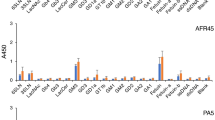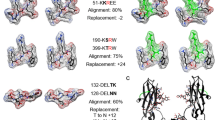Abstract
RABBIT antibodies of the immunoglobulin G (IgG) class have been shown to be cleaved by pepsin, in the absence of mercaptans, into bivalent fragments1. These fragments, termed F(ab′)2-fragments, sediment in the ultracentrifuge at 5S and are resistant to further cleavage. Similar products have been observed after peptic digestion of human IgG antibodies2. In contrast, others found that human immunoglobulin M (IgM) was rapidly degraded by pepsin into a heterogeneous mixture of small fragments3–5. Incubation of IgM cold agglutinins with the enzyme in buffer at pH. 4.0 and 37° C for 30 min, or 4° C for 48 h, resulted in the complete loss of red cell agglutinating activity3. Efforts to demonstrate residual combining activity by an indirect agglutination technique were unsuccessful. Similarly, treatment of IgM anti-γ-globulins (rheumatoid factors) by pepsin at 4° C for 48 h resulted essentially in complete loss of activity, as measured by several agglutination methods3. I have examined further the degradation of human IgM anti-γ-globulins by pepsin and present evidence of the production of fragments that retain the capacity to combine with human IgG.
This is a preview of subscription content, access via your institution
Access options
Subscribe to this journal
Receive 51 print issues and online access
$199.00 per year
only $3.90 per issue
Buy this article
- Purchase on Springer Link
- Instant access to full article PDF
Prices may be subject to local taxes which are calculated during checkout
Similar content being viewed by others
References
Nisonoff, A., Wissler, F. C., Lipman, L. N., and Woernley, D. L., Arch. Biochem. Biophys., 89, 230 (1960).
Osterland, C. K., Harboe, M., and Kunkel, H. G., Vox Sang., 8, 133 (1963).
Harboe, M., Scand. J. Clin. Lab. Invest., 17, Suppl. 84, 233 (1965).
Kishimoto, T., Onoue, K., and Yamamura, Y., J. Immunol., 100, 1032 (1968).
Mihaesco, C., and Seligmann, M., Immunochemistry, 5, 457 (1968).
Schrohenloher, R. E., Kunkel, H. G., and Tomasi, T. B., J. Exp. Med., 120, 1215 (1964).
Schachman, H. K., Ultracentrifugation in Biochemistry (Academic Press, New York, 1959).
Schrohenloher, R. E., J. Immunol., 99, 115 (1967).
Franklin, E. C., Kunkel, H. G., and Ward, J. R., Arthritis and Rheumatism, 1, 400 (1958).
Waller, M., and Vaughan, J., Proc. Soc. Exp. Biol. and Med., 92, 198 (1956).
Schrohenloher, R. E., and Barry, C. B., J. Immunol., 100, 1006 (1968).
Franklin, E. C., Kunkel, H. G., Müller-Eberhard, H. J., and Holman, H. R., Ann. Rheum. Dis., 16, 315 (1957).
Miller, F., and Metzger, H., J. Biol. Chem., 241, 1732 (1966).
Metzger, H., Proc. US Nat. Acad. Sci., 57, 1490 (1967).
Author information
Authors and Affiliations
Rights and permissions
About this article
Cite this article
SCHROHENLOHER, R. Degradation of Human IgM Anti-γ-Globulin by Pepsin provides Evidence of an Active Fragment. Nature 223, 308–310 (1969). https://doi.org/10.1038/223308a0
Received:
Issue Date:
DOI: https://doi.org/10.1038/223308a0
Comments
By submitting a comment you agree to abide by our Terms and Community Guidelines. If you find something abusive or that does not comply with our terms or guidelines please flag it as inappropriate.



